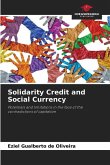The training sector in solidarity institutions contributes to the socio-economic development of the actors in particular and the community in general. This book analyzes the solidarity institutions in the different trainings they organize. The aim here is to determine the way in which training is organized, to identify its impact and to demonstrate its effectiveness and efficiency. The actors involved in the training process are the ones that allow us to understand the effects and demonstrate their importance. It is demonstrable that the entities within which training is organized ensure that it is effective, efficient and efficient. Socio-economic development is therefore based on permanent and continuous solidarity training that can make the participants more innovative, but also on the practice of the trained person's skills. However, regular follow-ups and evaluations are factors that allow to encourage, orient or reorient the beneficiaries of the trainings. It is then necessary for the institutions that know the environment, the population of the environment for training.
Bitte wählen Sie Ihr Anliegen aus.
Rechnungen
Retourenschein anfordern
Bestellstatus
Storno








